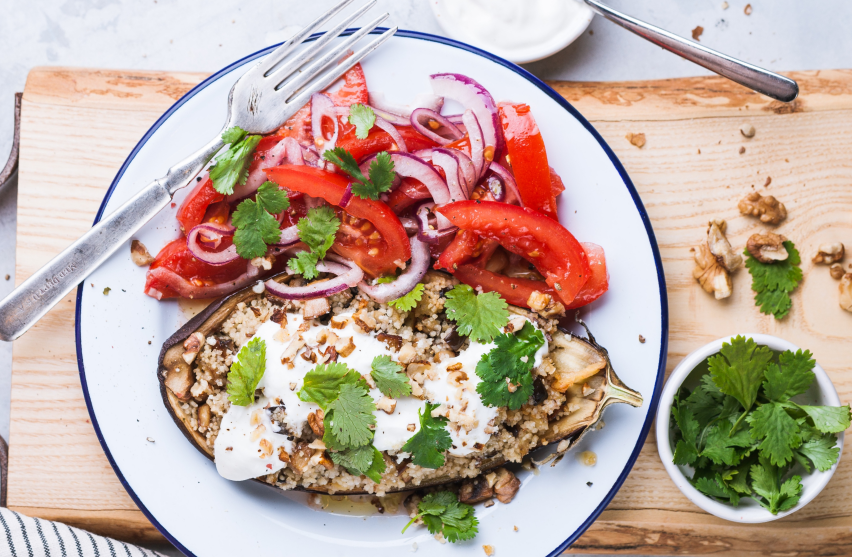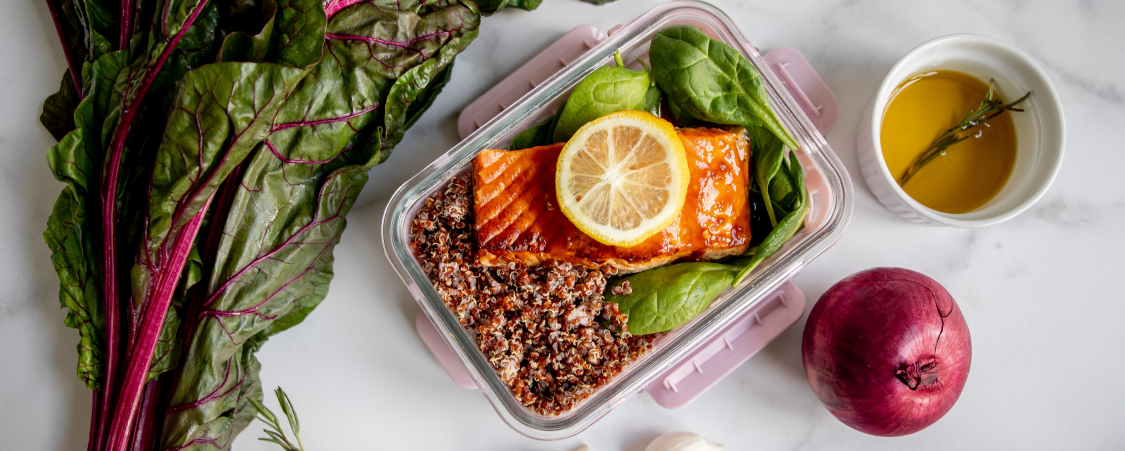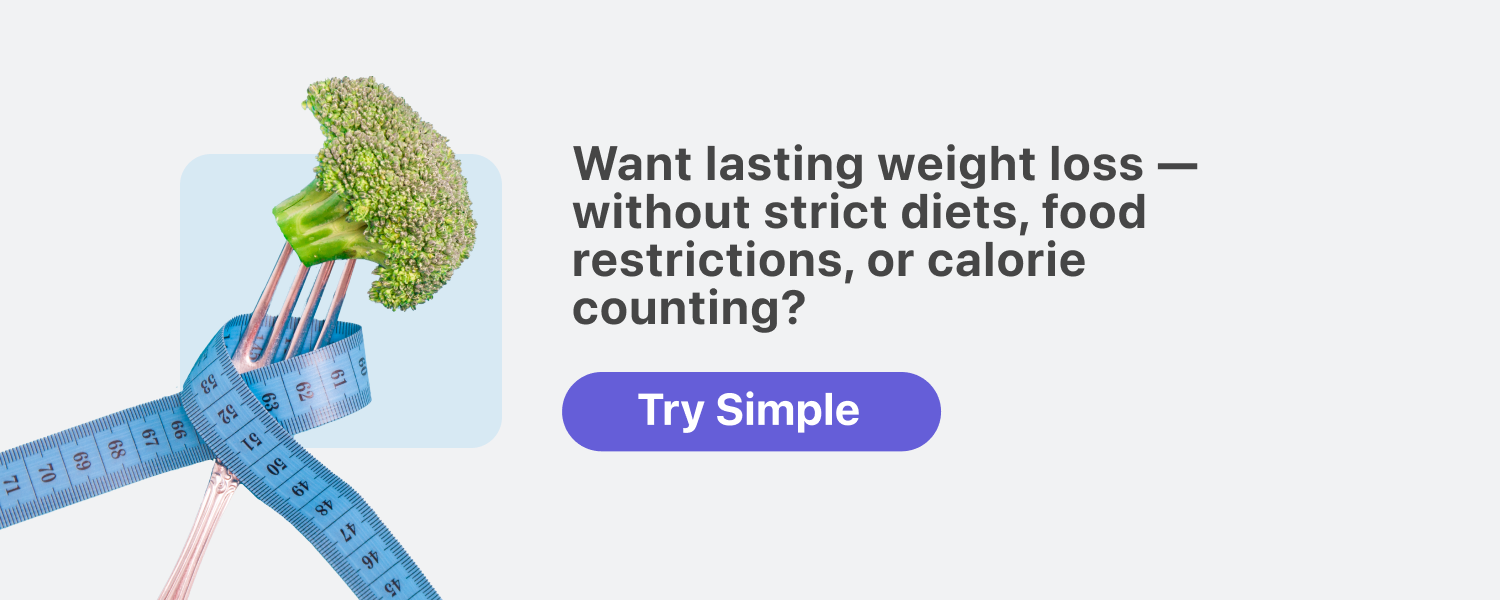The Mediterranean diet for weight loss

People have loved the Mediterranean diet for many years.
It’s not a “weight loss diet,” per se.
It’s just how people in places close to the Mediterranean Sea naturally eat. But it can help you lose weight and allow you to enjoy what you’re eating in the bargain.
Time and time again, research has found the Mediterranean diet to be effective for weight loss and to lead to results that last.[1]
As we’ll see, the Mediterranean diet is packed with flavor, easy to follow, and gives plant-based foods — like vegetables and fruits, whole grains, legumes, nuts, and seeds — a starring role.

Pasta isn’t “off-limits,” and both extra virgin olive oil and red wine have a legit place in the food list. It also has some credentials for your eco-friendliness and social health, both of which are powerful inputs into your sense of well-being.[2]
So, is the Mediterranean diet good for weight loss? Yes.
Could it be for you? Let’s find out.

What is the Mediterranean diet?
The Mediterranean diet mirrors the traditional eating and drinking habits of people from countries like Greece and Italy and is dominated by many staple foods that support weight loss and good health, like:
- fruits
- veggies
- whole grains
- beans
- nuts
- seeds
- fish
- olive oil
Foods that are refined and processed, have added sugar, or are high in unhealthy fats are notably absent from the Mediterranean menu.
The Mediterranean diet isn’t prescriptive in terms of portions, calorie intake, etc., and it doesn’t have any hard and fast rules. It’s more of an easy-going, “eat more of this, eat less of that” vibe. And ultimately, different interpretations lead to different results.
Health benefits of the Mediterranean diet
Reading the food list above, you can probably start to deduce some of the health benefits of the Mediterranean diet.
It’s known for improving a whole bunch of things,[2] including:
- cardiovascular health [3]
- obesity
- blood pressure [4]
- metabolic syndrome
- cholesterol [5]
- diabetes and blood sugar control [6]
- age-related cognitive dysfunction [7]
- brain disorders, like dementia and Alzheimer’s [8]
- longevity [9]
- inflammation [10]
That’s quite the list, huh!
Health risks of the Mediterranean diet
There are, of course, risks we might experience when trying to follow this specific way of eating. There are healthy — and not-so-healthy — ways to do it. Like overeating healthy fats (because nuts and olive oil are very nommable). Or getting a bit too excited that red wine is allowed and drinking a bottle a night “because Resveratrol!”
You may have to work harder at getting enough protein, as animal products like meat and dairy are limited. Plus, the high fiber content might give you some discomfort in the gastric / bowel department.
All these can be avoided with smart food choices that suit you, your body, and your goals. Learning how to meal plan will help a ton here.
The Mediterranean diet and weight loss — does it really work?

You’ve probably lost count of the number of times you’ve heard that eating more veggies, whole grains, and fish will help you lose weight.
So, while the Mediterranean diet isn’t a weight loss diet as such, you can see how, by encouraging you to eat these foods, weight loss will likely follow. In a systematic review, for instance, the Mediterranean diet helped people lose between 9 and 22 lbs in one year.[1]
It’s got a pretty strong track record for lasting weight management, too. Research showed that people following the Mediterranean diet gained less weight over a five-year period than those who weren’t. This study, which tracked people for 12 years (!), found that those who ate a Mediterranean-style diet had a lower risk of becoming overweight or obese than those who did not.[11] Another study found that sticking to a Mediterranean diet made it twice as likely that weight loss would be maintained.[12]
The Mediterranean diet doesn’t guarantee you’ll lose weight, of course. Neither is it “better” at producing weight loss results than any other diet, as the systematic review showed.[1]
It’s just one way to potentially reach your goals that’ll work for you if you get along with it well enough to stick to it long term.
So, how does the Mediterranean diet work for weight loss?
There are a few reasons why weight loss happens so readily on the Mediterranean diet.
It’s heavy on fiber-rich plant-based foods
Fibrous foods play a key role in weight loss and reducing body fat.[13,14]
They’re filling and give us energy without being high in calories. They can help stave off unwanted snacking, too. Research suggests that legumes like beans and lentils, in particular, may have special powers for weight loss.[15] Just eating them, even without intentionally reducing calories, could bump your weight down!
And veggies, well. They’ve always been on the A-team for weight management.[16]
Whole grains are encouraged
Whole grains are a foundational food in the Mediterranean diet.
From a weight loss POV, choosing whole grains over refined ones makes for better results, as a 2019 study shows.[17]
That’s because, again, they’re filling without bringing a whole load of calories to the party, so you naturally eat less but stay energized.
Pasta isn’t a pariah
Pasta is often one of those foods that gets junked when weight loss is the goal. On the Mediterranean diet, though, pasta has a place.
It’s part of the team and one of the foods that carries the real nutrition stars like olive oil, veggies, and seafood.
It’s got some positives of its own, like being a good source of carbohydrates and energy, but one of the real bonuses here is that a little pasta (if you love it) can make a bowl of veggies (which you may love less, atm), feel far more appealing.
For extra credit, make it whole grain.
There’s a whole-food focus
A whole-food focus means that refined and ultra-processed foods are pushed wayyyyyy down the pecking order.
That’s helpful for losing weight because eating ultra-processed foods can easily rack up the calories, sugar, and unhealthy fat and leave you short of quality nutrients.[18]
So, making swaps like:
- home-cooked meals instead of ready-made meals
- water instead of soda
- nuts instead of chips
- fresh fish instead of processed meat
will for sure give your weight loss and health improvement goals a leg up.

The Mediterranean diet for weight loss meal plan
If you’re keen to try the Mediterranean diet, let’s start pulling together a meal plan for you.
Some breakfast ideas might be:
- omelet with spinach, tomatoes, and peppers
- oatmeal with blueberries, almonds, and cinnamon
- Greek yogurt with pumpkin seeds and strawberries
Some lunch options could be:
- Greek salad with chicken, feta, olives, cucumbers, and tomatoes
- mackerel with salad greens and quinoa
- roast turkey with lentils, bell peppers, and tomatoes
Some possibilities for dinner may be:
- baked salmon with broccoli and brown rice
- tuna steak with sautéed kale and pearl barley
- grilled chicken with butternut squash and freekeh (never heard of freekeh? Try it; it’s surprisingly good!)
Take the foods in the list below and get creative with flavor combos that will make your mouth water!
If you’re following an intermittent fasting schedule, simply slot these meals into your eating window.
If you’re not following an intermittent fasting schedule — but you’re keen to try it — check out our Simple quiz, and we’ll get you up and running!
Foods to eat on the Mediterranean diet

Let’s get into the specifics here. What are your food choices if you’re eating a Mediterranean diet (whether for weight loss or not)?
Stock your pantry, fridge, and kitchen cupboards with these:
- whole grains: brown rice, whole grain pasta, oats, quinoa, bulgar wheat, freekeh, and pearl barley
- legumes: beans, lentils, chickpeas, and split peas
- nuts: almonds, walnuts, hazelnuts, cashews, and pistachios
- seeds: pumpkin seeds, flax seeds, sunflower seeds, and chia seeds
- fruits: apples, bananas, pears, melons, peaches, oranges, berries, grapes, and figs
- vegetables: cauliflower, broccoli, Brussels sprouts, asparagus, tomatoes, kale, spinach, carrots, mushrooms, sweet potatoes, leafy greens, peppers, cucumber, and squash
- fish: cod, salmon, mackerel, haddock, plaice, and tuna
- seafood: shrimp, clams, mussels, oysters, and crab
- healthy fats: avocadoes, avocado oil, olives, and olive oil
- poultry: chicken, turkey, duck, and goose (in moderate amounts)
- dairy: cheese, yogurt, and milk (in moderate amounts)
- eggs (in moderate amounts)
One thing to note here: these foods work together.
The more fully you embrace the full range of foods, the more impact this diet will have on your weight loss results.
So, as you work on introducing the Mediterranean diet into your life, expand your repertoire to encompass alllllll the Mediterranean foods.
What about drinks?
Water is, as always, the beverage of choice. Tea and coffee are both fine, and one glass of red wine a day is on plan should you desire it (and feel good about it).
Foods to avoid on the Mediterranean diet
The Mediterranean diet isn’t super strict — it has plenty of flexibility.
That said, the general principle that underpins the Mediterranean diet is whole foods, mostly plants.
These foods, therefore, tend not to show up:
- red meat
- candy, cake, and chocolate
- chips, crackers, and cookies
- soda
- alcohol (beyond red wine)
- processed meat, like bacon and sausages
- butter
Let’s be real: no food is “forbidden,” regardless of what diet you’re following. You’re the boss here. If you choose to follow the Mediterranean diet but with a weekly fix of steak and whisky, you do you.
It’s what you do most of the time that matters, so the occasional dalliance away from what’s strictly “Med. approved” will be just fine.
5 Mediterranean diet recipes that can help with weight loss
Want some Mediterranean diet-inspired recipes? Check out our Instagram, where we have full instructions and video how-tos for:
- mushroom shawarma
- eggplant cannelloni
- veggie and egg breakfast wrap
- spicy salmon rice muffins (spoiler alert: these aren’t really “muffins”!)
- baked avocado with chicken
and more!
Pros and cons of the Mediterranean diet for weight loss
| Pros | Cons |
| Many delicious foods included | You may need cooking skills |
| No calorie counting | All diets take discipline |
| Proven track record for weight loss | Perhaps more fiber than you’re used to |
| Proven health benefits | Could be expensive |
| Good for the planet | Fat is easy to overeat |
Pros
The Mediterranean diet has a lot going for it.
With the foods on the “Eat” list, it’s very possible to make your daily menu taste great.
With all the fiber, complex carbs, and protein, there are built-in mechanisms for naturally controlling appetite and calories.
It’s got a strong track record for weight loss and improving metabolic health.
And, as it’s plant-centered and prioritizes whole, fresh foods over processed, packaged ones, it’s pretty planet-friendly.
Cons
That said, switching to the Mediterranean diet would take some effort to do.
Eating more whole, fresh foods means prepping and cooking, which may be skills you need to learn. Your food budget may go up.
The high fiber content could make you a little … ahem … uncomfortable in the gastric department, as could more high-fat foods.
Plus, those high-fat foods are easy to overeat, and like all diets, it’ll take discipline — and practice — to consistently make good choices.
5 pro tips for success when doing the Mediterranean diet for weight loss

If you’re keen to know how to lose weight most effectively on the Mediterranean diet, here are some things that’ll increase your chances of success.
- Get veggies and/or fruits in at breakfast
Whatever your breakfast, throw some veggies at it. No better way to smash your morning routine than to knock out one or more of your 5-a-day. It’s only 8:30 AM, and you’re already killing it!
Plus, this is a sneaky behavior-change trick you can play on yourself:
Focus more on eating more health-promoting food and less on worrying about less health-promoting food. Over time, the nutritious stuff will change your palate and your habits and start squeezing out the less nutritious choices all by themselves.
- Become a carb connoisseur
Less bread, potatoes, white rice, and white pasta. More beans, pulses, lentils, brown rice, and whole wheat pasta. We know options like pulses and legumes can seem harder to work with. You can’t mash a bean or air fry a chickpea like you can a potato.
Or can you … ?
Experiment with some ideas. You might discover you love roasted chickpeas or lentil dhal. Or if that seems too big a jump right now, simply switch your white rice for brown and/or your white pasta for whole wheat. Baby steps for the win!
- Keep it simple
If you’re not (yet) a great cook, choose easy, ready-to-go ingredients like:
- bagged salad / spinach
- frozen veggies
- canned tuna
- canned chickpeas / lentils
- pre-prepared grains like brown rice / quinoa
- rotisserie chicken
- quick cook oats
- hummus
You don’t have to be hitting gourmet heights straight out of the blocks. What’s the easiest way to get some tasty Mediterranean diet foods on your plate?
- Keep red wine as an occasional thing
Sure, it has some health benefits, but it’s a pretty hefty source of calories, too.
When you do have it, savor the heck out of it and enjoy it deeply.
- Look after your lifestyle
When your Mediterranean diet is in a sweet spot and you’re chugging along well, turn your attention to other aspects of the weight loss puzzle, like exercise, sleep, and stress.
If you’re looking for ways to make a dent in any of these, we’ve got some great tips to get you started here: how to burn fat.
(Science suggests that exercise pairs well with the Mediterranean diet for weight loss, so if you’re open to moving your body more, that’s a solid pick.)[19]
There are no foods that are “not allowed” on the Mediterranean diet.
That said,there are some foods that are not on the official Mediterranean diet food list, like candy, red meat, and chips.
Healthy snacks on the Mediterranean diet include nuts, seeds, or fruit (but you can snack on anything really; after all, a “snack” is just a mini-meal).
You can eat chocolate on the Mediterranean diet, but it’s not technically a part of the diet.
Fat loss vs. weight loss are two different things, yet the Mediterranean diet can help you lose both.

- Mancini JG, Filion KB, Atallah R, Eisenberg MJ. Systematic Review of the Mediterranean Diet for Long-Term Weight Loss. Am J Med. 2016 Apr;129(4):407–15.e4.
- Guasch-Ferré M, Willett WC. The Mediterranean diet and health: a comprehensive overview. J Intern Med. 2021 Sep;290(3):549–66.
- Martínez-González MA, Gea A, Ruiz-Canela M. The Mediterranean Diet and Cardiovascular Health. Circ Res. 2019 Mar;124(5):779–98.
- De Pergola G, D’Alessandro A. Influence of Mediterranean Diet on Blood Pressure. Nutrients [Internet]. 2018 Nov 7;10(11).
- Hernáez Á, Castañer O, Elosua R, Pintó X, Estruch R, Salas-Salvadó J, et al. Mediterranean Diet Improves High-Density Lipoprotein Function in High-Cardiovascular-Risk Individuals: A Randomized Controlled Trial. Circulation. 2017 Feb 14;135(7):633–43.
- Martín-Peláez S, Fito M, Castaner O. Mediterranean Diet Effects on Type 2 Diabetes Prevention, Disease Progression, and Related Mechanisms. A Review. Nutrients [Internet]. 2020 Jul 27;12(8).
- Féart C, Samieri C, Barberger-Gateau P. Mediterranean diet and cognitive function in older adults. Curr Opin Clin Nutr Metab Care. 2010 Jan;13(1):14–8.
- Andreu-Reinón ME, Chirlaque MD, Gavrila D, Amiano P, Mar J, Tainta M, et al. Mediterranean Diet and Risk of Dementia and Alzheimer’s Disease in the EPIC-Spain Dementia Cohort Study. Nutrients [Internet]. 2021 Feb 22;13(2).
- Campanella A, Misciagna G, Mirizzi A, Caruso MG, Bonfiglio C, Aballay LR, et al. The effect of the Mediterranean Diet on lifespan: a treatment-effect survival analysis of a population-based prospective cohort study in Southern Italy. Int J Epidemiol. 2021 Mar 3;50(1):245–55.
- Ghosh TS, Rampelli S, Jeffery IB, Santoro A, Neto M, Capri M, et al. Mediterranean diet intervention alters the gut microbiome in older people reducing frailty and improving health status: the NU-AGE 1-year dietary intervention across five European countries. Gut. 2020 Jul;69(7):1218–28.
- Agnoli C, Sieri S, Ricceri F, Giraudo MT, Masala G, Assedi M, et al. Adherence to a Mediterranean diet and long-term changes in weight and waist circumference in the EPIC-Italy cohort. Nutr Diabetes. 2018 Apr 25;8(1):22.
- Poulimeneas D, Anastasiou CA, Santos I, Hill JO, Panagiotakos DB, Yannakoulia M. Exploring the relationship between the Mediterranean diet and weight loss maintenance: the MedWeight study. Br J Nutr. 2020 Oct 28;124(8):874–80.
- Miketinas DC, Bray GA, Beyl RA, Ryan DH, Sacks FM, Champagne CM. Fiber Intake Predicts Weight Loss and Dietary Adherence in Adults Consuming Calorie-Restricted Diets: The POUNDS Lost (Preventing Overweight Using Novel Dietary Strategies) Study. J Nutr. 2019 Oct 1;149(10):1742–8.
- Jovanovski E, Mazhar N, Komishon A, Khayyat R, Li D, Blanco Mejia S, et al. Can dietary viscous fiber affect body weight independently of an energy-restrictive diet? A systematic review and meta-analysis of randomized controlled trials. Am J Clin Nutr. 2020 Feb 1;111(2):471–85.
- Kim SJ, de Souza RJ, Choo VL, Ha V, Cozma AI, Chiavaroli L, et al. Effects of dietary pulse consumption on body weight: a systematic review and meta-analysis of randomized controlled trials. Am J Clin Nutr. 2016 May;103(5):1213–23.
- Nour M, Lutze SA, Grech A, Allman-Farinelli M. The Relationship between Vegetable Intake and Weight Outcomes: A Systematic Review of Cohort Studies. Nutrients [Internet]. 2018 Nov 2;10(11).
- Roager HM, Vogt JK, Kristensen M, Hansen LBS, Ibrügger S, Mærkedahl RB, et al. Whole grain-rich diet reduces body weight and systemic low-grade inflammation without inducing major changes of the gut microbiome: a randomised cross-over trial. Gut. 2019 Jan;68(1):83–93.
- Hall KD, Ayuketah A, Brychta R, Cai H, Cassimatis T, Chen KY, et al. Ultra-Processed Diets Cause Excess Calorie Intake and Weight Gain: An Inpatient Randomized Controlled Trial of Ad Libitum Food Intake. Cell Metab. 2019 Jul 2;30(1):67–77.e3.
- Esposito K, Kastorini CM, Panagiotakos DB, Giugliano D. Mediterranean diet and weight loss: meta-analysis of randomized controlled trials. Metab Syndr Relat Disord. 2011 Feb;9(1):1–12.
